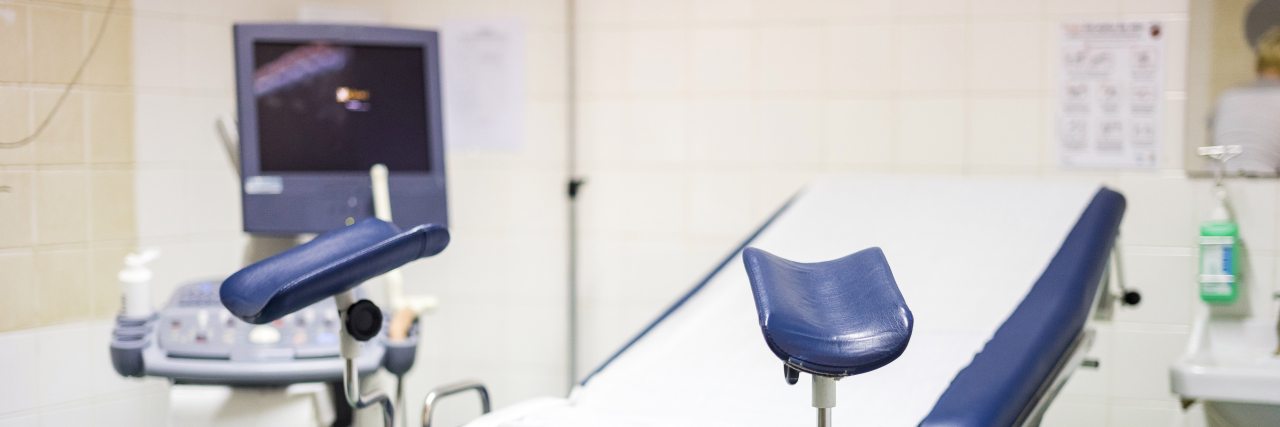Dear Gynecologist,
My name is Monika and I am a child sexual abuse survivor with endometriosis. I’m writing to you today to voice my concerns with those in your profession about your proficiency in interacting with patients like me within your practice. I understand that there isn’t much emphasis on what is called “trauma-informed care” in your training and frankly, it shows. I have been to numerous gynecologists throughout my life and each experience was worse than the previous one. Pelvic exams are uncomfortable at best for all women, but for women with a trauma history and a chronic illness requiring more frequent visits to a gynecologist, the experience can be downright traumatizing. My sincere wish in writing to you is not to demonize you or your profession, but rather to offer some words of advice on how you could make your patients more comfortable and less triggered when they come to see you.
First, your intake paperwork should inquire about any history of trauma. A patient may not divulge this information verbally because they may feel ashamed, but if there was a box to check on a new patient form, they might be more likely to at least indicate that there is something to look out for. Additionally, all staff from reception to nurses should be on the lookout for any indication of trauma including, but not limited to extreme anxiety, reluctance to enter the exam room, or any physical or verbal cues that a patient is experiencing dissociation or otherwise checking out and not able to consent to treatment.
Next, I understand that insurance companies require you to get patients in and out quickly, but it behooves you to spend at least some time talking to a patient. Ask them if they are scared or concerned about what to expect. Offer detailed explanations of what you will be doing and why. And ask for consent at each stage of the exam. The patient needs to feel as though they are in control of their own body while they are laying there in such a vulnerable position. Have the nurse offer to hold the patient’s hand for comfort and please verbally announce every step of the exam so that the patient knows what is happening. And if at any point a patient requests that you cease, don’t pressure them by saying “We’re almost done.” Just stop. All of these steps can create an environment where a patient feels as though they have bodily autonomy and that they will not be violated.
Third, make it a point to incorporate questions about a patient’s overall health and wellness, including asking about relationships, whether or not they are sexually active, if sex is painful, and if sex is satisfactory. Sexual dysfunction can be a huge red flag when it comes to many reproductive illnesses like endometriosis, but it’s not something we are socialized to talk about openly, so most of us won’t bring it up unless prompted. You should also ask about urinary tract health, bowel movements, and digestion. Concerns surrounding any of these might also be a clue as to the presence of a condition you should be investigating. Basically, I’m saying that reproductive health involves more than just a patient’s vagina, uterus, and ovaries. It is a holistic thing that can extend to many other parts of a patient’s body and your awareness of this is critical to your patients receiving the comprehensive care that they deserve.
And finally, if a patient tells you that something feels off… believe them. We are pretty perceptive about our bodies and what we know to be our own “normal.” If we say our periods are disproportionately painful, don’t insist that all periods are painful. If we say our menstrual flow is excessive or that there are weird clots, don’t dismiss this. And above all, never insinuate that our concerns are purely psychological in nature. Women generally have a very high pain tolerance and a very low level of comfort with expressing their needs to others. We’ve been socialized to not be a bother and to put on a happy face. The container of a doctor’s office should be the one place where we don’t have to don a mask of perfection and we can be fully ourselves without judgment.
All of these things are just good practice in general, but they are particularly necessary for those with vulnerabilities like mine. It is well documented that survivors of sexual violence are less likely to seek routine gynecological care because of their trauma, so when they do finally muster the courage to come see you, give them every opportunity to express their concerns. Otherwise, they will likely become one of the many who will suffer in silence unnecessarily with conditions like endometriosis.
One final note. As a woman who has chosen not to procreate, don’t ever interject your opinion about my choice during an exam. Comments about my changing my mind or it being a shame or how being a parent is the greatest thing in life are completely out of line. The only questions regarding pregnancy that belong in an exam room involve contraception options. Your expertise about the pros and cons of each is welcome. Your personal biases or religious views on my sexual activity are not.
Thank you for taking the time to read my concerns. I do hope that you will take them to heart and implement them in your practice. Doing so will ensure a much more tolerable experience for your patients and will arm you with better tools and knowledge to treat them effectively and respectfully.
Getty image by Jacek_Sopotnicki.

